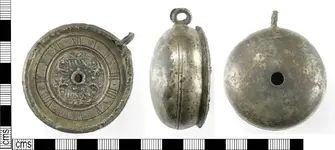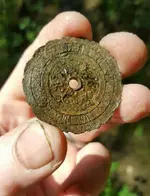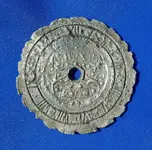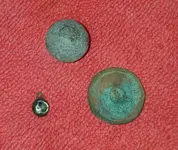DownNDirty
Bronze Member
- Joined
- Jun 1, 2015
- Messages
- 2,178
- Reaction score
- 3,207
- Golden Thread
- 1
- Location
- South Carolina
- 🥇 Banner finds
- 1
- 🏆 Honorable Mentions:
- 1
- Detector(s) used
- Minelab Equinox 800
- Primary Interest:
- All Treasure Hunting
Last weekend I was detecting in a creek that runs through a plantation that was started in the 1680s, where I have found many colonial era and some Rev War relics. There was a large brick mansion on the property with a main entrance road that crossed over the creek not far from the house. Saturday I discovered evidence of the bridge, mainly bricks in the bank and in the creek at one spot.
Tuesday Dirtstalker and I returned to the creek to hunt the bridge and the rest of the creek. I was working the bank where the bricks were and dug a brass flat button out of the side of the bank.
Then just a few feet away I hit another good signal and dug a flat, thin metal disc out of the bank about an inch deep. I could see that it was very ornamental and my initial thought was dandy button, but it had a small hole in the middle. I called Allen over and we looked it over and came up with a guess that it was a sundial.
The rest of the day was slow-I found a dropped. 69 caliber round ball and some sort of tiny silver bead and that was it. Allen's Deus went lame (but the AT Pro worked like a champ ) and we called it an early day.
) and we called it an early day.
I posted the mystery find this morning in the "What Is It" forum and several members made useful contributions. I also messaged Crusader about the item. He replied and told me that in the 18th century there were pewter toy pocket watches for "rich kids." Using this lead I used Google to find pictures of a toy watch face on the UK "Portable
Antiquities" web site:
https://finds.org.uk/database/artefacts/record/id/279671
I have posted a picture of another one found in the UK with the case.
These toy watches were made between 1700 and 1750. The faces were designed to mimic real watches made in the late 1600s; the one I found reads "HUX" and "LONDON". Hux made pewter watches during that period.
You can see diagonal notches along the rim; the toys had a spring and brass strip that rested on the rim. The kids could change the time by turning the dial clockwise and it would make a clicking noise.
I'm pretty stoked to find such a unique relic, especially knowing its provenance. The plantation owners were one of the wealthiest families in South Carolina in the 18th century and the toy probably belonged to one of their children. I would imagine the kid dropped it on the bridge and it fell through cracks and was lost for over 250 years-until my lucky day.
Tuesday Dirtstalker and I returned to the creek to hunt the bridge and the rest of the creek. I was working the bank where the bricks were and dug a brass flat button out of the side of the bank.
Then just a few feet away I hit another good signal and dug a flat, thin metal disc out of the bank about an inch deep. I could see that it was very ornamental and my initial thought was dandy button, but it had a small hole in the middle. I called Allen over and we looked it over and came up with a guess that it was a sundial.
The rest of the day was slow-I found a dropped. 69 caliber round ball and some sort of tiny silver bead and that was it. Allen's Deus went lame (but the AT Pro worked like a champ
 ) and we called it an early day.
) and we called it an early day. I posted the mystery find this morning in the "What Is It" forum and several members made useful contributions. I also messaged Crusader about the item. He replied and told me that in the 18th century there were pewter toy pocket watches for "rich kids." Using this lead I used Google to find pictures of a toy watch face on the UK "Portable
Antiquities" web site:
https://finds.org.uk/database/artefacts/record/id/279671
I have posted a picture of another one found in the UK with the case.
These toy watches were made between 1700 and 1750. The faces were designed to mimic real watches made in the late 1600s; the one I found reads "HUX" and "LONDON". Hux made pewter watches during that period.
You can see diagonal notches along the rim; the toys had a spring and brass strip that rested on the rim. The kids could change the time by turning the dial clockwise and it would make a clicking noise.
I'm pretty stoked to find such a unique relic, especially knowing its provenance. The plantation owners were one of the wealthiest families in South Carolina in the 18th century and the toy probably belonged to one of their children. I would imagine the kid dropped it on the bridge and it fell through cracks and was lost for over 250 years-until my lucky day.

Attachments
Last edited:
Upvote
15










